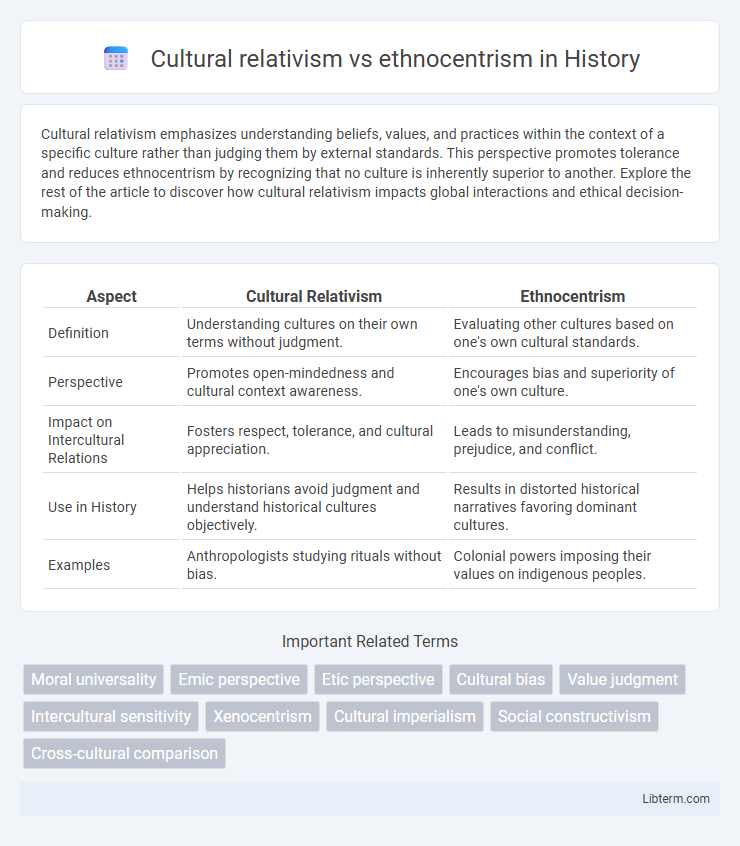Cultural relativism emphasizes understanding beliefs, values, and practices within the context of a specific culture rather than judging them by external standards. This perspective promotes tolerance and reduces ethnocentrism by recognizing that no culture is inherently superior to another. Explore the rest of the article to discover how cultural relativism impacts global interactions and ethical decision-making.
Table of Comparison
| Aspect | Cultural Relativism | Ethnocentrism |
|---|---|---|
| Definition | Understanding cultures on their own terms without judgment. | Evaluating other cultures based on one's own cultural standards. |
| Perspective | Promotes open-mindedness and cultural context awareness. | Encourages bias and superiority of one's own culture. |
| Impact on Intercultural Relations | Fosters respect, tolerance, and cultural appreciation. | Leads to misunderstanding, prejudice, and conflict. |
| Use in History | Helps historians avoid judgment and understand historical cultures objectively. | Results in distorted historical narratives favoring dominant cultures. |
| Examples | Anthropologists studying rituals without bias. | Colonial powers imposing their values on indigenous peoples. |
Defining Cultural Relativism
Cultural relativism is the principle that an individual's beliefs and activities should be understood by others in terms of that person's own culture, promoting respect for cultural diversity. This concept contrasts sharply with ethnocentrism, which involves evaluating other cultures based on the standards of one's own culture, often leading to biased judgments. Understanding cultural relativism requires recognizing that cultural practices and values are relative and must be assessed within their specific social and historical contexts.
Understanding Ethnocentrism
Ethnocentrism is the belief in the inherent superiority of one's own culture or ethnic group, often leading to prejudice and misinterpretation of other cultures. This perspective can result in biased judgments and hinder cross-cultural understanding by evaluating other societies solely through the lens of one's cultural norms. Recognizing ethnocentrism is essential for promoting cultural relativism, which advocates for assessing cultures based on their own values and contexts rather than imposing external standards.
Historical Roots of Both Concepts
Cultural relativism emerged from early 20th-century anthropology, particularly through Franz Boas' rejection of ethnocentrism and emphasis on understanding cultures within their own contexts. Ethnocentrism, rooted in human evolution and social identity theories, reflects the tendency to view one's own culture as superior, influencing colonialism and nationalism historically. These contrasting perspectives shaped the development of cross-cultural studies by challenging biases and promoting a more objective analysis of cultural diversity.
Key Differences Between Cultural Relativism and Ethnocentrism
Cultural relativism promotes understanding and evaluating cultural practices based on their own values and context, emphasizing open-mindedness and respect for diversity. Ethnocentrism involves judging other cultures through the lens of one's own cultural norms, often leading to bias and misinterpretation. The key difference lies in cultural relativism fostering acceptance and empathy, whereas ethnocentrism results in cultural superiority and prejudice.
Examples of Cultural Relativism in Practice
Cultural relativism is exemplified by the acceptance of diverse marriage customs, such as the practice of arranged marriages in India, which contrasts with Western ideals of romantic unions. In medical anthropology, cultural relativism guides practitioners to respect traditional healing methods like Ayurveda in Nepal or acupuncture in China without imposing Western medical standards. These examples highlight cultural relativism's role in promoting understanding and tolerance by evaluating cultural practices within their specific social and historical contexts.
Real-World Instances of Ethnocentrism
Ethnocentrism manifests in real-world instances such as colonial attitudes where dominant cultures impose their values on others, exemplified by European colonizers viewing indigenous practices as inferior. Nationalistic movements often emphasize cultural superiority, leading to xenophobia and discrimination against minority groups. Corporate globalization sometimes reflects ethnocentrism when businesses prioritize home-country norms and management styles over local customs, causing cultural misunderstandings and conflicts.
Impacts on Cross-Cultural Communication
Cultural relativism promotes understanding and respect for diverse cultural practices, reducing misunderstandings and fostering effective cross-cultural communication. Ethnocentrism, by contrast, leads to biased judgments and stereotypes, creating barriers and conflicts in intercultural interactions. Emphasizing cultural relativism improves empathy and collaborative problem-solving in globalized environments.
Cultural Relativism in Global Ethics
Cultural relativism in global ethics emphasizes understanding and evaluating moral values, practices, and beliefs within their specific cultural contexts rather than judging them by external standards. This approach promotes tolerance, respect, and open dialogue among diverse societies by recognizing that ethical norms evolve from unique historical, social, and environmental factors. By fostering cultural relativism, global ethics aims to reduce ethnocentrism, which often leads to bias, discrimination, and conflict due to the imposition of one culture's values over others.
Overcoming Ethnocentric Biases
Overcoming ethnocentric biases requires embracing cultural relativism, which promotes understanding and evaluating cultures based on their own values and beliefs rather than through the lens of one's own culture. This approach reduces prejudice, fosters cross-cultural empathy, and enhances effective communication in diverse social and professional settings. Key strategies include active listening, exposure to different cultural practices, and education on cultural diversity to challenge ingrained stereotypes and assumptions.
Why Embracing Cultural Relativism Matters Today
Embracing cultural relativism fosters global understanding by encouraging respect for diverse cultural practices, reducing prejudice and ethnocentric bias that often lead to conflict. This approach promotes social cohesion and effective communication in increasingly multicultural societies and international relations. Recognizing cultural relativism enhances empathy and supports inclusive policies that honor different worldviews without imposing one's own cultural norms.
Cultural relativism Infographic

 libterm.com
libterm.com